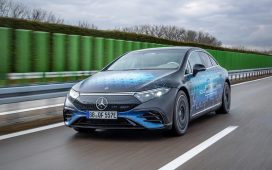
Germany, the Netherlands and Poland will establish a cross-border ‘model corridor’ for military traffic from west to east.
The German State Secretary Möller and her Dutch counterpart Kajsa Ollongren as well as the Polish Defense Minister Władysław Kosiniak-Kamysz have now signed a declaration of intent on the subject in Brussels, Belgium.
The focus is primarily on the transport of troops, material and supplies from the deep-sea ports on the North Sea to the particularly exposed Nato eastern flank.
Since the annexation of Crimea by Russia in 2014, which violated international law, Nato has continued to increase its troop presence in Eastern Europe as a deterrent. When exercises and operations in the event of threats occur, reinforcements must reach the eastern flank quickly to compliment this Eastern European force structure.
Rationale for a military transport corridor
Following a high level symposium on military mobility hosted by the Royal Higher Institute for Defence in Brussels on 30-31 January 2024, the three nations came together to agree to hasten military deployments across the continent.
Access the most comprehensive Company Profiles
on the market, powered by GlobalData. Save hours of research. Gain competitive edge.

Company Profile – free
sample
Your download email will arrive shortly
We are confident about the
unique
quality of our Company Profiles. However, we want you to make the most
beneficial
decision for your business, so we offer a free sample that you can download by
submitting the below form
By GlobalData
“In a conflict every second matters. Investing in military mobility is not just a commitment; it is an investment for today and tomorrow to allow our armed forces to respond faster to crises at our borders and beyond,” said Josep Borrell, the head of the European Defence Agency in his keynote speech.
Speakers pointed to the need to achieve these objectives with a whole of government approach: government, civil industries, ministries of defence, and actors involved in land, air, and sea transport need to work closely together.
Notably, this assertion comes just after the British Army Chief of Staff General Patrick Sanders called for the UK to come to terms with the reality that it has become a “pre-war generation” and that civil society ought to “mobilise” accordingly. While some people mistook this assertion as a call for national conscription, it was rather a call to mobilise aspects of public life.
In the same way, Europe’s future ‘model corridor’ is not merely a defence endeavour but a venture that will touch other civilian agencies and organisations as part of a whole government approach.
Although, it remains unclear whether the German, Dutch and Polish governments will convert existing public infrastructure for the project; none of their ministries immediately commented on the question.
It is also unclear whether this new infrastructure will extend to rail and airways.
Nevertheless, Borrell still continued to insert the ambiguity in his speech: “Efficient and seamless transportation of troops and materials across Europe is a logistical, administrative and infrastructure challenge.
“We must address bottlenecks through co-operation and investment, to ensure rapid movement for the security of Europe.”

Existing European initiatives
While the Netherlands has stepped up as the lead co-ordinator for this new corridor venture, Germany currently serves as the lead co-ordinator for another existing European logistical project.
The LogHubs – or Logistical hubs – project uses a network of existing logistic installations for multi-national business to prepare equipment for operations, to commonly use depot space for spare parts or ammunition and to harmonise transport and deployment activities.
“To achieve this, transport and operational activities must be co-ordinated between the European armed forces. There should be hubs for military logistics across the EU – the so-called LogHubs – to be provided,” the German Ministry of Defence stated in a press release.











